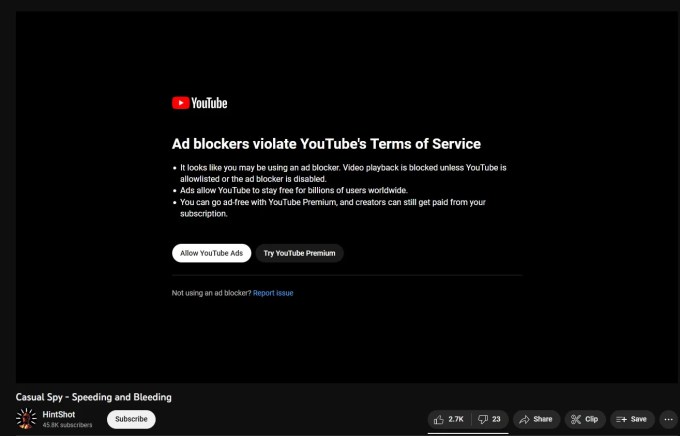YouTube is running a new experiment to limit usage on ad blockers by asking users to turn it off or buy a premium subscription after three videos.
Users on Reddit posted screenshots of the streaming service showing a warning sign to people using an ad-blocking extension on desktop as spotted first by Bleeping Computer. The warning says “Video player will be blocked after 3 videos.” The message below states that “It looks like you maybe using an ad blocker. Video playback will be blocked unless YouTube is allowlisted or the ad blocker is disabled.”

Image Credits: u/Reddit_n_Me
Another user posted a screenshot after YouTube blocked access to the video. “Ad blockers violate YouTube’s Terms of Service,” the message reads. Some users have experienced YouTube restricting ad blockers on mobile as well.

Image Credits: Reddit (opens in a new window)
The company told TechCrunch that this warning sign is part of an experiment.
“We’re running a small experiment globally that urges viewers with ad blockers enabled to allow ads on YouTube or try YouTube Premium,” it said in a statement.
Additionally, Google said that if users don’t allow YouTube on the ad blocker, it may disable playback for some time in “extreme cases.”
The company has also conducted some experiments to push people to premium subscriptions in the past. Last year, it briefly ran a test asking users to purchase a paid plan to watch 4K videos. Last September, it even tested showing up to 11 unskippable ads at the start of the video for an uninterrupted experience.
Last year, YouTube said that it has more than 80 million subscribers across Music and Premium offerings.
YouTube limits ad blocker usage in new test by Ivan Mehta originally published on TechCrunch
source https://techcrunch.com/2023/06/30/youtube-limits-ad-blocker-usage-in-new-test/
Comments
Post a Comment